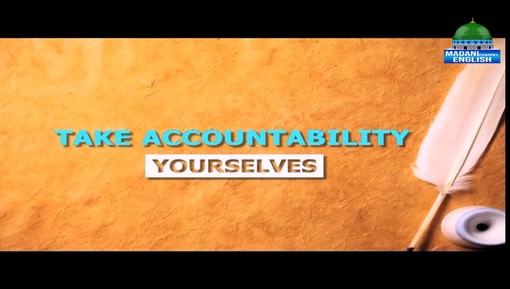
A Heartfelt Plea
Develop Self-Accountability
Mawlana Muhammad Imran Attari
Chairperson of Dawat-e-Islami’s Central Executive Committee
I used to know an astute shopkeeper who I often noticed recording his daily sales in a diary. To this, he added all his daily expenses, such as tea, transport, and lunch. At the close of the working day, he would calculate his profit and compare it to the previous day. This is a fairly common business practice that allows entrepreneurs and business owners to improve their worldly life. Shopkeepers carefully note all the credit they give. At the end of the month, they collect payment from customers. Along with these daily and monthly accounts, businesspeople can have even more dates for accounting.
It has also been seen that in the name of career planning, people place their past before themselves and look at their present, and they place their present before themselves and look at their future, and they plan to do even better than before.
When it comes to worldly life, we dedicate a lot of time and thought to “taking account.” This type of accounting is a part of life. Yet is it not untenable and rather inane when we put so much effort into the affairs of this temporary abode of ours but fail to account our affairs related to the permanent abode of the Hereafter?
It is possible that you filed your company accounts at the end of the fiscal year and started new ones with a strategic plan to avoid past mistakes. Like this, to better your worldly future, you have set goals and even begun to act upon them.
Along with setting goals and developing an action plan to improve business activities this year and avoid last year's mistakes, did you set goals and develop an action plan to improve your relationship with Allah and avoid last year's sins? In fact, did you take account of your life and draw up a strategy to garner more deeds than misdeeds? Have we sincerely repented for the prayers and fasts we missed, the rights of people we violated, and the parameters of Islam we flouted? Where is our action plan to make up those prayers, fasts, and rights?
Just as we are presently thinking about our future worldly life, have we also pondered about the most important matters that we will face in the future, i.e., death and the grave? Have we planned for our meeting with Allah? Alongside keeping an account of how much we spent and earned in a day, do we also keep an account of how many sins and how many good deeds we have done daily?
Just as we become concerned in the case of earning less and spending more, do we become aggrieved when our sins outnumber our deeds? On the day we do not make any profit, but incur a loss in our business, our mood becomes low, we become regretful, and we do not feel like speaking to anyone, but on the day we committed more sins than good deeds, or only committed sins, did we censure ourselves and cry over our state due to our loss in the Hereafter?
The second Caliph of Islam, Sayyiduna ʿUmar b. al-Khaṭṭāb رَضِىَ الـلّٰـهُ عَـنْهُ would strike his foot with a leather whip every night and ask himself, “What did you do today?”[1] He also said, “Take yourself to account before you are taken to account.”[2] Sayyiduna ʿUmar رَضِىَ الـلّٰـهُ عَـنْهُ was guaranteed Paradise by the final Prophet صَلَّى الـلّٰـهُ عَلَيْهِ وَاٰلِهٖ وَسَلَّم himself, yet that did not stop him from taking himself to account.
We should also take ourselves to account every day like this: What did we do today? How many good deeds did we perform? Did we flout a teaching of Islam? In the case of committing a sin, repent and remedy it. For example, if you harmed someone, then alongside repenting, you should apologise to that person. If you missed salah, repent and make up the salah. This action of repenting and making amends must be done daily.
Sayyiduna Ḥasan al-Baṣrī رَحْمَةُ الـلّٰـهِ عَلَيْه states:
A believer is a governor over his carnal-self; he continues to take it to account for the sake of Allah Almighty. And those who take themselves to account in the world will face easier accountability in the hereafter, and those who do not take themselves to account will face severe accountability on the Day of Reckoning.
Sayyiduna Mālik b. Dīnār رَحْمَةُ الـلّٰـهِ عَلَيْه said, “May Allah Almighty have mercy on the person who takes his carnal-self to account, and in being strict with it, he obliges it to enumerate its evils, condemns it for these evils, and places a bridle on it, compelling it to follow the Quran.”[3]
From the many favours of my spiritual guide and the leader of Ahl al-Sunnah, Mawlana Ilyas Attar al-Qadiri دَامَـتْ بَـرَكَـاتُـهُـمُ الْـعَـالِـيَـهْ , is that he fosters and promotes a culture of self-accountability. To help us, he has prepared a small but powerful device: the Pious Deeds checklist. I strongly encourage all of you to access it, either as a booklet or app, and, for the sake of Allah Almighty, begin using it to take account of yourself. May Allah Almighty grant us the ability to spend the new year in avoiding sins and performing good deeds.
اٰمِیْن بِجَاہِ النَّبِیِّ الْاَمِیْن صَلَّی اللہ تَعَالٰی عَلَیْہِ وَاٰلہٖ وَسَلَّم
Note: Brothers have 72 Pious Deeds, sisters have 63, male students of Jamia-tul-Madina have 92, female students of Jamia-tul-Madina have 83, children have 40, special Islamic brothers have 27, imprisoned individuals have 52, and those performing Hajj and Umrah have 19. Each checklist is complemented with extensive guidance.

















Comments